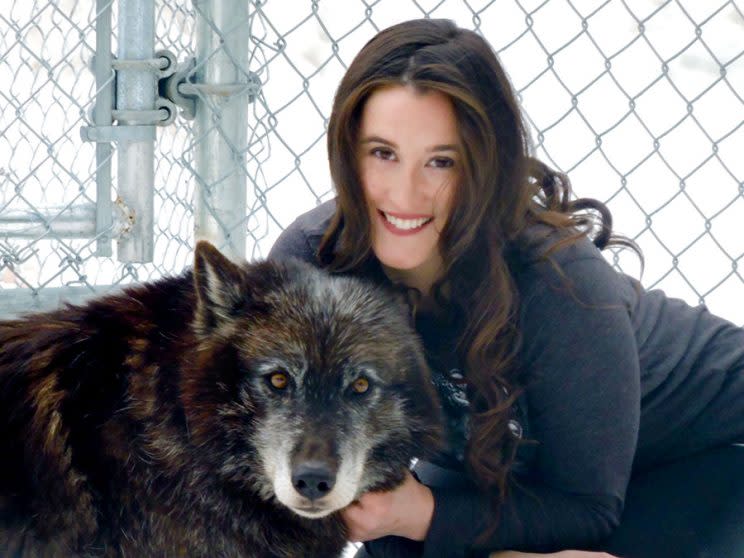Recovering Anorexic Woman Credits ‘Wolf Therapy’ for Saving Her Life

A 28-year-old woman says that dedicating her life to a pack of wolves has helped treat the eating disorder that nearly killed her. But experts warn that the “treatment” is not a known one.
Sarah Varley told the Mercury Press (in a story reprinted by the New York Post) that she developed post-traumatic stress disorder (PTSD), which evolved into a fear of germs, after being raped at the age of 19. As a result, she allowed herself to eat only morsels of food, resulting in a 33-pound weight loss over the course of five months. And then she came into contact with wolves at her cousin’s wolf sanctuary.
“I was scared of everything, but one day I went into the enclosure with a wolf and it was the first time my brain shut up,” she said. “When you’re with a predator that can hurt you, your brain automatically focuses on that.”
Varley and her fiancé decided to move to New Hampshire and run their own wolf sanctuary, with 50 wolves and wolf dogs, before settling in California, where they are starting a new wolf sanctuary.
“I think it’s empowering for women to know they can heal in other ways,” she stated. “It’s also kind of badass, no one is going to attack me again — I live with wolves. It’s a huge sense of relief.”

But it’s important to note that Varley’s form of healing is just one anecdotal response, experts say. “I have never heard of wolf therapy,” Ilene Fishman, clinical adviser for the National Eating Disorders Association (NEDA), tells Yahoo Beauty. “One suggested experience with an extreme situation like this, I would question.”
Psychotherapist Andrew Walen concurs with Fishman’s take on Varley’s situation. “Wolf therapy is not a recognized form of therapy that I have ever heard of or has been studied by anybody,” Walen, founder and CEO of the Body Image Therapy Center and board president for the National Association for Males with Eating Disorders, tells Yahoo Beauty. “The fact that this is a person who claims to have recovered from anorexia, which is a very serious brain disease that has so many additional complications, using this one therapy — I find it very dubious, to say the least.”
According to statistics from NEDA, at least 30 million Americans — 20 million women and 10 million men — suffer from a clinically significant eating disorder at some time in their life, including anorexia nervosa, bulimia nervosa, binge eating disorder, or EDNOS (eating disorder not otherwise specified). The National Association of Anorexia Nervosa and Associated Disorders (ANAD) says that about half of anorexia patients have co-morbid anxiety disorders, including obsessive-compulsive disorder and social phobia.
Walen does add, however, that animals can serve a purpose during treatment, especially when the patient has endured trauma. “We use therapy animals all the time, and in fact, many eating disorder treatment programs will incorporate equine therapy as one of their treatment modalities,” he notes. “But it’s an adjunct piece — it’s not the whole piece. It’s not a direct, standalone therapy for anything by anybody’s psychiatric standpoint.”
Fishman is concerned about the specifics Varley offered during her interview (i.e. the limited amount of food she consumed). “We at NEDA feel very strongly about not publishing details like these because it can be very triggering for people,” she explains. “Some people can end up trying to find ways to be even more anorexic.”
While there are numerous types of therapies for the treatment of eating disorders, Fishman says, the first step on this wellness journey is to obtain credible data from a reputable source. “When you look up eating disorders, there’s tons of information on the Internet and on social media, and while some of it is good, some of it is not so good,” she says. “It’s important to get the facts from somewhere solid. For example, the information NEDA provides is clear — it’s medically and professionally sound.”
Fishman also strongly suggests seeking guidance from someone who specializes in the treatment of eating disorders, adding, “And we know that people generally do not get better without treatment.”
In conclusion, Walen offers this possible explanation for Varley’s recovery: “I think living with wolves and living away from society is just another form of isolation behavior that still speaks to a significant psychiatric issue.”
Let’s keep in touch! Follow Yahoo Beauty on Facebook, Twitter, Instagram, and Pinterest.

